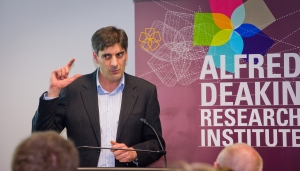Contemporary History Group launched
Research news
It's been a rough time for journalists and journalism in Australia recently, but there was a moment of relief when Deakin University honoured the craft at a special function in Melbourne in June.
In the same week as News Ltd and Fairfax caused great angst among those whose veins are filled with the printer's ink by announcing they were embracing the digital age has never before, distinguished Australian journalists Hugh Lunn and George Megalogenis helped the Alfred Deakin Research Institute (ADRI) launch its breakthrough Contemporary History Group.
The theme for the launch was the journalist as historian, a category into which both speakers fell more than comfortably.
“In Australia, we are familiar with journalists transforming into historians,” said ADRI's inaugural Director, Professor David Lowe.
"Some of the best known Australian histories of wars were penned by trained journalists – such as Charles Bean, Gavin Long, Chester Wilmot and Alan Moorhead.
“Today, some of my colleagues are broadening such lines of inquiry - exploring the other, non-soldier voices in recalling Australia’s wars; we are exploring the legacies of the atomic bombs, with which the Second World War ended, and the uses of atomic energy since then; and others are investigating Australian and other perspectives on international change after the two world wars, in particular the consequences of decolonisation in our region.
“As we at the Alfred Deakin Research Institute move to establish Australia’s first Contemporary History Group, the role of journalists in our community, is high on our mind.
“Although once described as the “first rough draft of history”, journalism’s drafts aren’t always so rough.
“That is why we invited two of Australia’s pre-eminent journalists to be our guest speakers - and also hasten the process of their acquiring dual citizenship as journalists and historians.
“I recall, for example, that after writing an influential biography of Jo Bjelke Peterson, Hugh Lunn began to be introduced at functions, not as The Australian newspaper’s Queensland Editor, but as the bloke who write the book about Joh.
“For his part, George Megalogenis, wrote a book called Faultlines with the historian’s favoured triple-barrelled subtitle -race, work and the politics of changing Australia in this case.
"If he had made it ‘race, class and gender historian status would have been conferred instantly.
"George then went on to give not one but two chapters the title, ‘unfinished business’, so I rest my case."
Reminiscing about his experiences as a young war correspondent in Vietnam, Hugh urged journalists and historians alike to write about what they were seeing, not what they were being told.
“A lot of people like to get quotes, I understand that,” Lunn said.
“But the most important thing to me to write what you are seeing before you.
“It may not make you popular, but it the only way to do your job properly.”
Megalogenis, most recently the author of the much-praised book Australian Moment, said this book represented his transition from journalist to author.
“My first two books were written before and after work as journalists tend to write their books,” he said.
“With this book, I wanted something more than that.”
Megalogenis went to archives as a first source, and also to a number of former Prime Ministers, from whom he sought praise for each other, rather than the usual political points scoring.
“Once they got that they wouldn’t be going into the book unless they did that, it became a much more interesting exercise,” he said.
So interesting, and so compelling, that another prominent journalist/historian, David Marr described Megalogenis as "the sanest journalist in Australia".
Another highlight of the night was the launching by the University's Vice-Chancellor, of ADRI's new website.
Share this story
 The sanest journalist in Australia, George Megalogenis.
The sanest journalist in Australia, George Megalogenis.
